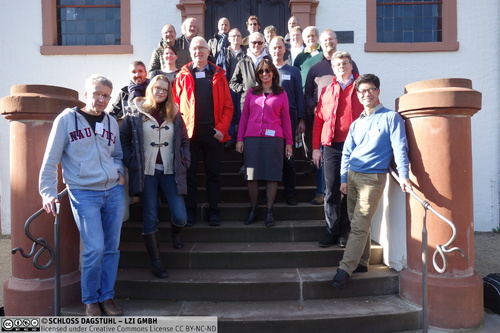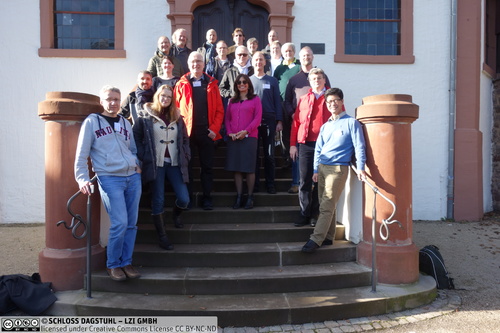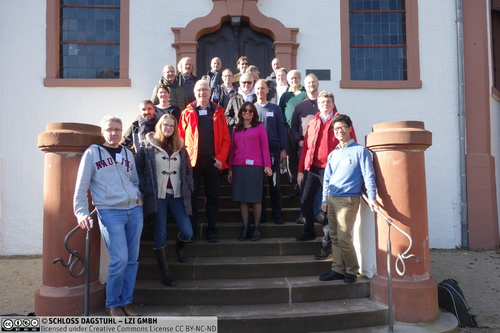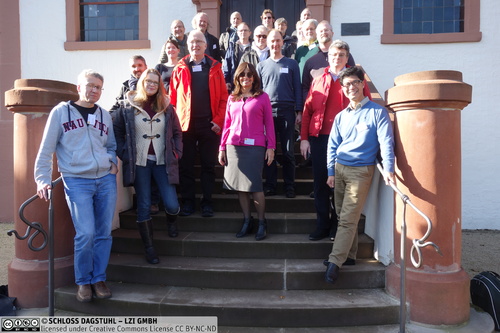Dagstuhl Perspectives Workshop 17442
Towards Cross-Domain Performance Modeling and Prediction: IR/RecSys/NLP
( Oct 29 – Nov 03, 2017 )
Permalink
Organizers
- Nicola Ferro (University of Padova, IT)
- Norbert Fuhr (Universität Duisburg-Essen, DE)
- Gregory Grefenstette (IHMC - Paris, FR)
- Joseph Konstan (University of Minnesota - Minneapolis, US)
Contact
- Michael Wagner (for scientific matters)
- Simone Schilke (for administrative matters)
Publications
- Towards Performance Modeling and Performance Prediction across IR/RecSys/NLP (Dagstuhl Perspectives Workshop 17442). Nicola Ferro, Norbert Fuhr, Gregory Grefenstette, and Joseph A. Konstan. In Dagstuhl Reports, Volume 7, Issue 10, pp. 139-146, Schloss Dagstuhl - Leibniz-Zentrum für Informatik (2018)
- From Evaluating to Forecasting Performance: How to Turn Information Retrieval, Natural Language Processing and Recommender Systems into Predictive Sciences (Dagstuhl Perspectives Workshop 17442). Nicola Ferro, Norbert Fuhr, Gregory Grefenstette, Joseph A. Konstan, Pablo Castells, Elizabeth M. Daly, Thierry Declerck, Michael D. Ekstrand, Werner Geyer, Julio Gonzalo, Tsvi Kuflik, Krister Lindén, Bernardo Magnini, Jian-Yun Nie, Raffaele Perego, Bracha Shapira, Ian Soboroff, Nava Tintarev, Karin Verspoor, Martijn C. Willemsen, and Justin Zobel. In Dagstuhl Manifestos, Volume 7, Issue 1, pp. 96-139, Schloss Dagstuhl - Leibniz-Zentrum für Informatik (2018)
Impacts
- Causality, prediction and improvements that (don’t) add : position paper - Fuhr, Norbert - Aachen : CEUR, 2018. - 1 page.
- The Dagstuhl Perspectives Workshop on Performance Modeling and Prediction : article - Ferro, Nicola; Fuhr, Norbert; Zobel, Justin; Shapira, Bracha; Nie, Jian-Yun; Magnini, Bernardo; Kuflik, Tsvi; Gonzalo, Julio; Geyer, Werner; Ekstrand, Michael D.; Declerck, Thierry; Konstan, Joseph A.; Grefenstette, Gregory; Perego, Raffaele; Soboroff, Ian; Tintarev, Nava; Verspoor, Karin; Willemsen, Martijn C. - New York : ACM, 2018. - pp. 91-101 - (Sigir forum ; 52. 2018, 1).
Information systems, which manage, access, extract and process non-structured information, typically deal with vague and implicit information needs, natural language and complex user tasks. Examples of such systems are information retrieval (IR) systems, search engines, recommender systems (RecSys), machine translation, and so forth. The discipline behind these systems differs from other areas of computer science, and other fields of science and engineering in general, due to the lack of models that allow us to predict system performances in a specific operational context and to design systems ahead to achieve a desired level of effectiveness. In the type of information systems we want to look at, we deal with domains characterized by complex algorithms, dependent on many parameters and confronted with uncertainty both in the information to be processed and the needs to be addressed, where the lack of predictive models is somehow bypassed by massive trials of as many combinations as possible.
These approaches relying on massive experimentation, construction of testbeds, and heuristics are neither indefinitely scaled as the complexity of systems and tasks increases nor applicable outside the context of big Internet companies, which still have the resources to cope with them.
This Dagstuhl Perspectives Workshop will deal with the problem of modelling and predicting performances of information retrieval systems, recommender systems, and natural language processing (NLP) systems. This is an important and open issue common to all these three neighboring fields and it prevents both a deep scientific understanding and an effective engineering of such systems. Progress in modelling and prediction would allow us to better design such systems to achieve desired performance under given operational conditions.
We believe that bringing together these three communities has strong potential for advancing research on predictive models of performance. Indeed, the idea of predictive modeling is not new – each discipline has articulated the need and taken steps in this direction but these efforts have not succeeded yet.
We will challenge participants against some topics relevant to the prediction of system performances, among which:
- Characterisation of Corpora before Exploitation
- Characterisation of IR/NLP/Rec Systems before Exploitation
- Beyond A-B testing
- Estimating Performance without A-B Testing
- Using Simulation to Predict Performance
- Can Deep Learning replace actual user performance measurement?
- Predicting Human Experience and Performance
- Rich Metrics: Moving from Correctness to Usefulness
- Performance guarantees vs. expected average performance
- Performance-related axioms and proofs
The result we seek, therefore, is a trans-disciplinary research agenda that draws from the combination of intense focus and the exchange of ideas. This "manifesto" will include steps that can be taken within as well as across disciplines, and we hope it can serve as a roadmap for both researchers and research funders.
 Nicola Ferro, Norbert Fuhr, Gregory Grefenstette, and Joseph A. Konstan
Nicola Ferro, Norbert Fuhr, Gregory Grefenstette, and Joseph A. Konstan
Information systems, which manage, access, extract and process non-structured information, typically deal with vague and implicit information needs, natural language and complex user tasks. Examples of such systems are information retrieval (IR) systems, recommender systems (RecSys), and applications of natural language processing (NLP) such as e.g. machine translation, document classification, sentiment analysis or search engines. The discipline behind these systems differs from other areas of computer science, and other fields of science and engineering in general, due to the lack of models that allow us to predict system performances in a specific operational context and to design systems ahead to achieve a desired level of effectiveness. In the type of information systems we want to look at, we deal with domains characterized by complex algorithms, dependent on many parameters and confronted with uncertainty both in the information to be processed and the needs to be addressed, where the lack of predictive models is somehow bypassed by massive trials of as many combinations as possible.
These approaches relying on massive experimentation, construction of testbeds, and heuristics are neither indefinitely scaled as the complexity of systems and tasks increases nor applicable outside the context of big Internet companies, which still have the resources to cope with them.
The workshop was organized as follows. The first day was devoted to plenary talks focused on providing a general introduction to IR, RecSys, and NLP and on digging into some specific issues in performance modeling and prediction in these three domains. The second day, participants split into three groups - IR, RecSys, and NLP - and explored performance modeling and prediction issues and challenges within each domain; the working groups then reconvened to present the output of their discussion in a plenary session in order to cross-fertilize across disciplines and to identify cross-discipline themes to be further investigated. The third day, participant split into groups which explored these themes - namely measures, performance analysis, documenting and understanding assumptions, application features, and modeling performance - and reported back in plenary sessions to keep all the participants aligned with the ongoing discussions. The fourth and fifth days have been devoted to the drafting of this report and the manifesto originated from the workshop.
This documents reports the overview of the talks given by the participants on the first day. The outcomes of the working groups - both within-discipline themes and cross-discipline themes -- as well as the identified research challenges and directions are presented in the Dagstuhl Manifesto corresponding to this Perspectives Workshop [1].
Acknowledgements. We thank Schloss Dagstuhl for hosting us.
References
- N. Ferro, N. Fuhr, G. Grefenstette, J. A. Konstan, P. Castells, E. M. Daly, T. Declerck, M. D. Ekstrand, W. Geyer, J. Gonzalo, T. Kuflik, K. Lindén, B. Magnini, J.-Y. Nie, R. Perego, B. Shapira, I. Soboroff, N. Tintarev, K. Verspoor, M. C. Willemsen, and J. Zobel. Manifesto from Dagstuhl Perspectives Workshop 17442 – Towards Performance Modeling and Performance Prediction across IR/RecSys/NLP. Dagstuhl Manifestos, Schloss Dagstuhl–Leibniz-Zentrum für Informatik, Germany, 7(1), 2018.
 Nicola Ferro, Norbert Fuhr, Gregory Grefenstette, and Joseph A. Konstan
Nicola Ferro, Norbert Fuhr, Gregory Grefenstette, and Joseph A. Konstan
- Pablo Castells (Autonomous University of Madrid, ES) [dblp]
- Elizabeth M. Daly (IBM Research - Dublin, IE) [dblp]
- Thierry Declerck (DFKI - Saarbrücken, DE) [dblp]
- Michael D. Ekstrand (Boise State University, US) [dblp]
- Nicola Ferro (University of Padova, IT) [dblp]
- Norbert Fuhr (Universität Duisburg-Essen, DE) [dblp]
- Werner Geyer (IBM TJ Watson Research Center - Cambridge, US) [dblp]
- Julio Gonzalo (UNED - Madrid, ES) [dblp]
- Gregory Grefenstette (IHMC - Paris, FR) [dblp]
- Joseph Konstan (University of Minnesota - Minneapolis, US) [dblp]
- Tsvi Kuflik (Haifa University, IL) [dblp]
- Krister Lindén (University of Helsinki, FI) [dblp]
- Bernardo Magnini (Bruno Kessler Foundation - Trento, IT) [dblp]
- Jian-Yun Nie (University of Montréal, CA) [dblp]
- Raffaele Perego (CNR - Pisa, IT) [dblp]
- Bracha Shapira (Ben Gurion University - Beer Sheva, IL) [dblp]
- Ian Soboroff (NIST - Gaithersburg, US) [dblp]
- Nava Tintarev (TU Delft, NL) [dblp]
- Karin Verspoor (The University of Melbourne, AU) [dblp]
- Martijn Willemsen (TU Eindhoven, NL) [dblp]
- Justin Zobel (The University of Melbourne, AU) [dblp]
Classification
- data bases / information retrieval
- modelling / simulation
- society / human-computer interaction
Keywords
- performance modelling
- performance prediction
- information retrieval
- natural language processing
- recommender systems





 Creative Commons BY 3.0 DE
Creative Commons BY 3.0 DE
